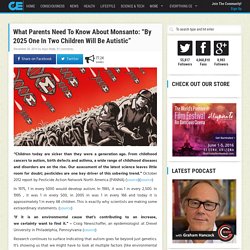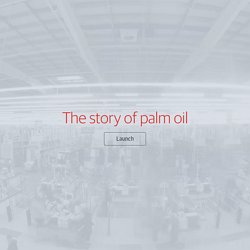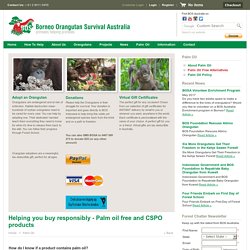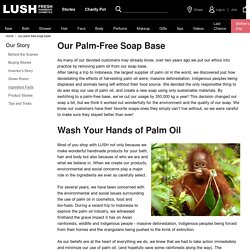

What Parents Need To Know About Monsanto: “By 2025 One In Two Children Will Be Autistic” “Children today are sicker than they were a generation ago.

From childhood cancers to autism, birth defects and asthma, a wide range of childhood diseases and disorders are on the rise. Our assessment of the latest science leaves little room for doubt; pesticides are one key driver of this sobering trend.” October 2012 report by Pesticide Action Network North America (PANNA) (source)(source) In 1975, 1 in every 5000 would develop autism. In 1985, it was 1 in every 2,500. ‘If it is an environmental cause that’s contributing to an increase, we certainty want to find it.” – Craig Newschaffer, an epidemiologist at Drexel University in Philadelphia, Pennsylvania (source) Research continues to surface indicating that autism goes far beyond just genetics. “It’s time to start looking for the environmental culprits responsible for the remarkable increase in the rate of autism in California At a recent event sponsored by the holistic-focused Groton Wellness Organization, she stated that: Dr.
Dr. The story of palm oil. Oliver Balch Photo: Alamy Global production of palm oil has doubled over the last decade, and is set to double again by 2020.

Driving much of this growth is the rapid expansion of demand in Asia’s populous emerging markets, where palm oil is liberally used in frying and cooking. Of the 59m metric tonnes (MT) of palm oil produced in the 2013/14 financial year, 42% was consumed in one of just three countries: India (8.3m MT), Indonesia (9.8m MT) and China (6.4m MT). Lagging behind in fourth are the 27 member states of the European Union, which collectively consumed just over 10% (6.2m MT).
Yet when it comes to certified sustainable palm oil (CSPO), the story is very different. Europe’s dominance in the CSPO trade isn’t altogether surprising. Eight European nations, including Germany, France and the Netherlands, have made voluntary commitments to make all palm oil imports 100% CSPO. Many of the huge corporate buyers driving demand for sustainable palm oil are headquartered in Europe. Helping you buy responsibly - Palm oil free alternatives. How do I know if a product contains palm oil?

Food Standards Australia and New Zealand allows palm oil to be labelled simply as “vegetable oil” and indeed its presence can be even less visible as many of the more minor components of a product - colourings, flavourings, emulsifiers and humectants – are commonly palm oil derived. A quick test - if the saturated fat content is around 50% the likelihood of the vegetable oil being palm is high. In cosmetics, palm oil is labelled Elaeis guineensis but as with the food industry, its presence is often less obvious. Any ingredient which includes the word “palm” (palmitate, palmitoyl or simply palm) will include palm oil.
Other ingredients which commonly but not always use palm oil include cetyl alcohol, isopropyl, sodium lauryl sulphate, steareths, fatty alcohol sulphates, glycerine, cocoa butter equivalent and cocoa butter substitute. How do I make an informed choice? Some comments to consider when reviewing the lists: Rainforest Action Network. Our Palm-Free Soap Base. As many of our devoted customers may already know, over two years ago we put our ethics into practice by removing palm oil from our soap base.

After taking a trip to Indonesia, the largest supplier of palm oil in the world, we discovered just how devastating the effects of harvesting palm oil were; massive deforestation, indigenous peoples being displaced and animals being left without their food source. We decided the only responsible thing to do was stop our use of palm oil, and create a new soap using only sustainable materials. By switching to a palm-free base, we’ve cut our usage by 350,000 kg a year! This decision changed our soap a bit, but we think it worked out wonderfully for the environment and the quality of our soap. We know our customers have their favorite soaps-ones they simply can’t live without, so we were careful to make sure they stayed better than ever! It seems to us that the only way to really tackle this problem is if palm oil becomes less popular. Orang Rimba.